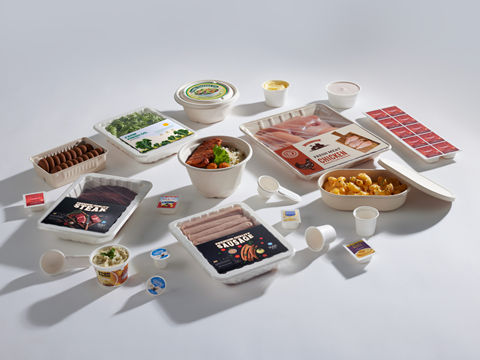
As part of our Finalist Interview series ahead of the Sustainability Awards, we spoke to Cirkla about its pulp-based packaging with a peel off liner, designed for high barrier applications and nominated in the Pre-Commercialized Recyclable Packaging category.
You’re a finalist in the Sustainability Awards 2024. Congratulations! To start off, could you summarize your entry, in less than 50 words?
Our innovation is an easy-peel liner on fibre packaging designed to unlock high barrier applications across industries including meat, food, dairy and cosmetics. Conventional fibre packaging with lamination has limited recyclability. Our technology enables easy separation and disposal of the lamination from the fibre tray post consumer use, ensuring full recyclability.
Why do you think the judges were impressed with your entry? Tell us about what is innovative about your project and/or about its impact on packaging sustainability.
Moulded fibre products are made from plant fibres such as sugarcane bagasse and wood pulp. They are recyclable in the paper stream (CEPI certified) and home compostable (OK Compost certified). The ability to mould pulp into various shapes makes it a very versatile technology to replace plastic across a variety of applications.
However, moulded fibre packaging has limited intrinsic barriers (oxygen, water vapour, moisture) of its own. Achieving these barriers requires the use of laminations - but using this lamination hampers the recyclability of the overall packaging, thus significantly restricting the potential of this technology to low barrier and low shelf-life (24-48 hours) applications.
Our easy-peel liner innovation solves this problem. Using our technology, the liner can be easily separated from the base fibre tray post consumer use. The fibre base is recyclable in the paper stream and the liner can be disposed of in the appropriate plastic stream, ensuring a fully recyclable solution.
This unlocks a tremendous potential to reduce plastic significantly with fibre packaging that is truly circular, performs like plastics and meets or beats plastic performance in terms of oxygen, oil and water barriers, microwaveability, ovenability, strength and rigidity; is engineered to fit seamlessly with existing packaging lines without any additional investment; usually within 10-20% of the cost of plastic - and in some cases at par as well - and available with commercial scale manufacturing to meet the demands of large brands at scale.
Finally, can you tell us about the ongoing development of your project, e.g. how your innovation/initiative has been received by the industry, or what the next steps are in commercialization/product development?
We have received a phenomenal response from brands across the US and EU, where there is a significant push for recyclable packaging. Though it requires consumers to take extra effort to peel and separate the liners, some brands see it as a great intermediate step until we have high barrier coatings that are recyclable too. Brands understand that going from plastic to plastic-free is a journey that will have to be traversed in phases.
Our innovation is market-ready. We’ve already tested with top meat producers in the US and will be launching in Q1 2025. Trials with other large global brands across the food, dairy, and cosmetics industries are underway.
The winners of the Sustainability Awards 2024 will be announced at the Sustainable Packaging Summit, taking place in Amsterdam on 12-13 November. The Summit mobilizes leaders of the FMCG value chain, policymakers, NGOs, recyclers and investors to collaborate, remove barriers and identify opportunities on the road to sustainable transformation.
To learn more or register, visit: https://www.packagingsummit.earth/2024
If you liked this story, you might also enjoy:
The ultimate guide to the Packaging and Packaging Waste Regulation in 2024
How are the top brands progressing on packaging sustainability?
Sustainable Innovation Report 2024: Current trends and future priorities
Everything you need to know about global plastic sustainability regulation














No comments yet